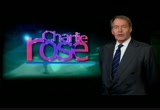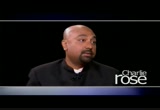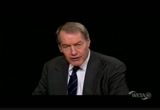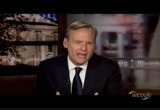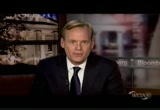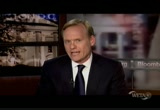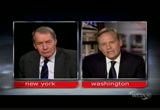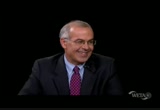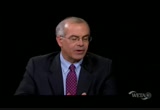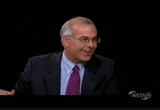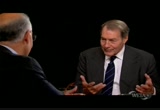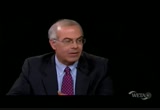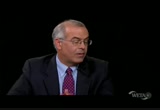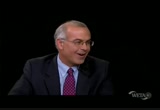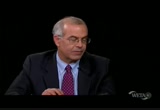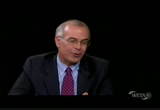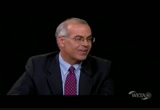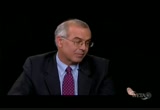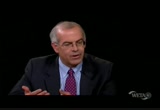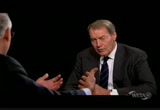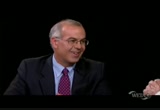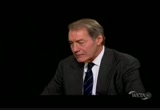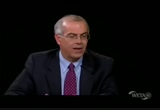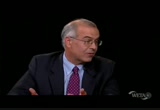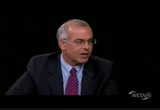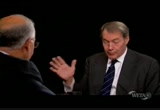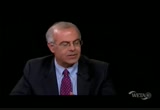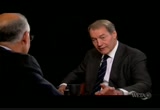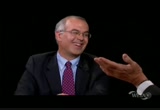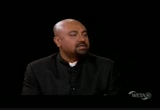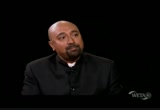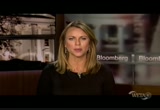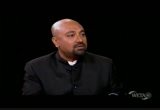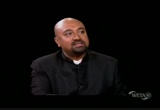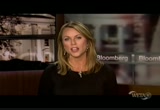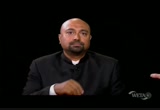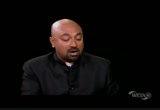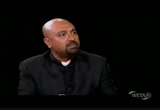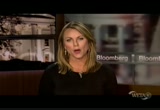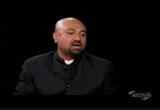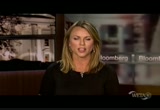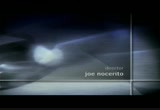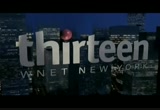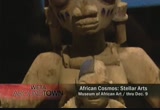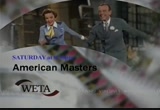tv Charlie Rose PBS September 14, 2012 12:00pm-1:00pm EDT
12:00 pm
>> rose: welcome to the program. we begin this evening with a look att the back and forth over foreign policy and protests in the middle east between governor romney and president obama. joining us is john dickerson of cbs. >> the long-standing tradition that in campaigns politics stops at the water's edge, senator van den berg's quote that may be a little bit outdated but romney jumped in so fast here that it was just kind of breaking with the normal tradition. but there is another point here which is i talked to a very senior military man last night who said first reports are always wrong. the reason you hold back for a minute is you just know the news is going to change. and in this case iting chad
12:01 pm
there were more deaths. and so romney's statement looked out of sync with the mourning and the shock that was going on when everybody woke up on wednesday morning. >> rose: we continue with a look at that and more with david brooks of "the new york times". and it underlines i think a problem with romney, which he is just not a philosophical guy. you know, the people who know him well like him. they say he's a good manager. he just doesn't have philosophical interests. >> rose: we conclude this evening with a look at the implication of protests in the middle east and the death are four americans, joining us lara logan of cbs news and time editor at large bobby ghosh. >> that's why what happens on friday at friday prayers is so critical because it is when those people pour out of the mosques after listening to those sermons, that is what is really going to determine how fast and how violently and quickly this spreads. you know, if the message in the mosques on friday is
12:02 pm
calm down and is one of moderation, then that could really help put an end to this. what we've seen in the past indicates that that is probably not likely. it's far more likely that you're going to have people incited to more protest and more violent-- violence. >> and this is the fruit of in some ways sort of ironically the product of democracy. in the old days pew barak and his police would-- mubarak would vet what was said in a mosque. you couldn't go to a moss knick cairo and speak out in anger against the united states without some consequencesment now that authority has been removed. the imams and other speakers at friday prayers are free to say almost whatever they want. and that makes the situation far more dangerous. >> protests and deaths in the middle east. and political implications in america when we continue. >> funding for charlie rose was provided byhe olg:lowin c c 1wi
12:04 pm
captioning sponsored by rose communications from our studios in new york city, this is charlie rose. in this presidential election of 2012 foreign policy was not considered to be an important factor. that's all changed now because on monday night when american diplomatic interests came under attack in egypt and libya, tragically ambassador chris stevens and three other americans were killed in benghazi, governor romney has attempted to make some political attacks out of the situation. and here is what he said. >> i think it's a-- a -- -- a terrible course for america to stand in apology for our values. >> rose: president obama responded in kind in a conversation with cbs news. >> governor romney seems to have a tendency to shoot first and name later.
12:05 pm
>> rose: the question is will this issue influence voters come november. more generally, how the nominees shaping up now that the conventions are out of the way. joining me from washington john dickerson, the political director of cbs news and a correspondent for "slate" magazine. and i am pleased to have him on this program. what do you make of this, john? >> well, it's funny, as you said, there has not been a lot of talk about foreign policy and it is the issue over which a president actually has a lot of control as president. the economy, the president doesn't have that much control. what i make of it is governor romney wants to force play here. he saw an opportunity, making his case about president obama apologizing for america and he saw an opportunity he wanted to grab it. because even though there are 50 some odd days left to go in the election, the pressure is on for romney to kind of move things and get things moving in this election. >> rose: what's interesting to me, though, facts are not quite what people have assumed them to be, because the press release first we learned that it was released before there had been protests in the streets or
12:06 pm
the charge against the embassy. and then we learned that, in fact, the press release was sent to the state department for approval and they said don't release it. i'm not sure what the language was they had trouble with. and then we see that the language that they are jumping all over, they're saying that the president or the administration apologized. and some people are saying they didn't really apologized. they called for simply tolerance or all sides. help me out. >> yeah, sure. well, so the embassy in cairo put out a statement t wasn't an apology it was basically saying that this film that was offending muslims was over the top. and the state department didn't like that. what it ultimately said was it added kind of a two pieces, one that the film was attacking islam and that that was not a good thingment but also that nothing is, that violence, there's no excuse for violence. that's kind of the double message that they wanted
12:07 pm
from washington. romney kind of jumped in between those two messages. kept calling it an apology. again this maps with one of his original critiques, that president obama goes around the world apologizing for america. a lot of people have looked at these so-called apologiesment they aren't anything of the kind. but that's the long-standing narrative romney has had. so he had an opportunity here to kind of plug back into that narrative. and when he says the word "apology" at a rally with republicans, the whole place lights up. >> rose: because they have context with it, they know he used it before as a charge against the obama administration. >> that's right. there is a largest contest which is that american foreign policy should never apologize. that america leads through strengthment you hear that all the time through governor romney. so this is a global argument between whether you do it through soft power and diplomacy or a more kind of forward-leaning to use a cliche approach that is a bit strong their romney advocates for. >> rose: but at the same time some republicans within his own party and some people who write about
12:08 pm
politics but are considered to be favorable to some of the things that governor romney believes in, are pushing back and saying this is not the place to do what he's doing. >> pushing back very hard. and it's a question of timing. you can have the views governor romney has but this republican critique argues that he jumped in too fast for a couple of reasons. one, the long-standing tradition that in campaigns politics stops at the water's edge. senator vandenberg's quote. that may be a little bit outdated but romney jumped in so fast here that it was-- it was just kind of breaking with the normal tradition. but there is another point here which is, i talked to a very senior military man last night who said first reports are always wrong. the reason you hold back for a minute is you just know the news is going to changement and in this case it changed there were more deaths, so romney's statement looked out of sync with the mourning and the shock that was going on when everybody woke up on wednesday morning. >> rose: did he use the word,
12:09 pm
as a sympathizer, did that come out of his mouth? >> well, the chairman of the republican party used those words to say that the president had-- had expressed sympathy with those who attacked the embassy. the word apology is not quite right here. and sympathy is even further in the wrong category. but, and again, as you mentioned, this is an attempt to make a statement put out by the embassy to turn that into words coming out of president obama's mouth. >> rose: so where is it now? >> it is, i think we've seen in this race a kind of, the polls have been stuck since may. i think that right now where it is romney wants to get back to talking about the economiment and so i think that this is a tempest, now moves on to a problem for president obama as we see continued unrest in egypt and libya and yemen. so it may if it's a protracted world problem, that could be a problem for president obama more than this problem for mitt romney over the last 24 hours. >> rose: john dickerson, thank you very much.
12:10 pm
pleasure. >> thanks, charlie. >> rose: john dickerson, my colleague at cbs news and a correspondent for "slate" magazine. back in a moment. stay with us. david brooks is here, a columnist for "the new york times"s and a career spanning nearly 30 years. he covered everything from russia and the middle east to books and movies. he currently writes about american politics, american culture, american science, american behavior. and much more. i am always pleased to have him share those ideas with us on this program. so welcome. >> don't forget bruce springstein. >> right. you never thought about writing a song by the way. >> that is truly beyond me. >> you never know. >> foreign policy, you and inn a column within the last six months said barack obama on foreign policy gets high marks from this columnist. >> right. and we've seen why in the contrast in the last couple of days. the american people always vote for the candidate who is more orderly, who seems
12:11 pm
to preserve stability and order especially in foreign policy. so in 2004 george bush seemed more orderly than john kerry, seemed safer, more secure oriented. in 2008 obama seemed more orderly and a safer pair of hands than mccain. >> rose: on the economy or -- >> on everything. and that is one of obama's strengths, that he has a sense of order and slowness and deliberation. a sense of gravity. >> rose: and he's not emotional. >> right. so i think that's reassuring. and then you look at romney, first of all, i think a lot of the media criticism is a little overblown of what he said but he's reacting to an apology, and a pseudoapology or so-called apology. he's not reacting to a policy. he's reacting to a sort of statement. so he's already off in an imaginary place. >> rose: but a press office that the state department in fact said don't issue. >> so he is reacting to a triviality, as john dickerson said, he's reacting to something too fast. and then he's reacting to
12:12 pm
something that is just off tone. and it underlines i think a problem with romney. which he is just not a philosophical guy. you know, the people who know him well like him. they say he's a good manager. he just doesn't have philosophical interests. and therefore he doesn't have a consistent core of beliefs that he's going to go back to in a time of crisis. >> rose: to problem solve-- es a a problem solver. >> right, so the reaction is you get is this sometimes false assertiveness on things like this and then a false nonassertiveness, anti-assertiveness like the substantive stuff like the core follows policy. so if you want to pick a philosophical fight about the obama administration to the arab spring that would be fine, but this is some pseudoimage event. >> rose: they have made some arguments. they said he had an opportunity to come down on the side of the people in the street in tehran and didn't do it he had an opportunity to foreign policy, he shouldn't have set a date of deadline with respect to afghanistan.
12:13 pm
>> they made some of that. but i still think they continually are getting lost on trivialities. and they keep avoiding their core argument. and it's been a problem for the campaign. >> rose: was it a problem not to talk about foreign policy in the acceptance speech? >> no, i mean this still is an economy election. >> rose: but at the same time, this san acceptance speech, it's not like you are saying, he didn't spend enough time on the economy, just something to say you know we've got men and women at risk around the world reasons right. >> rose: our first concern has to be our national security and their safety. >> well, here, the problem with that speech and it ties into this, is a management problem which is ironic for mitt romney. which is how many people in the campaign saw that speech. >> rose: that's exactly the question i have, david. >> so my understanding is not so many. so if you hand it out to 20 people, somebody says hey, you know, we really should mention the troops and everyone else says we should. but if you keep it closed, then you don't get that
12:14 pm
feedback. >> rose: yeah. >> and that's a magazine problem. and i think one of the things that has been disheartening to republicans is okay, mitt romney is not going to be ronald reagan. he is to the going to have that core of ideaological depths that reagan had but will manage well. the fact that they mismanaged the convention has been upsetting to a lot of republicans. >> rose: from clint eastwood on down around. >> that was one of them but just mismanaging the messaging. >> rose: and so what should they have done they did not do. >> well,. >> rose: like the specifics of what they would do to fix the problem. >> i think if you embrace paul ryan you are embracing an agenda whether you like it or not. and so you've got to say here's the problem, here's medicare, here's how we're going fix testimony here's what we are going to do. if you embrace paul ryan go all the way. >> rose: they didn't go all the way, they already changed the fact about the cuts in medicare. >> so they embrace paul ryne and then didn't go anywhere and buried all that, and so they were, you know, if are you going to take vienna
12:15 pm
take vienna. so they've got the worst of the ryan thing which is the vulnerabilities that clinton exploited and they don't have the strengths which is it's a plausible plan because they never explained that. >> rose: you believe it's a plausible plan. >> i have been-- i would say we've got this gigantic problem with medicare. we really don't know how to cut the costs. but it's plausible that the competition that ryan endorses will help reduce cost. >> rose: is it plausible that people all of a sudden will have spent money and therefore they will have to fall back on the mercy of the state because they didn't do it well? >> here's one of my many problem at the with the democratic convention. the republican convention lied about the obama welfare policy, the welfare policy. the democratic convention lied about the ryan romney medicare policy. they referred to a ryan momry plan, really a ryan plan from two years ago that would have-- that would have
12:16 pm
forced seniors to pay $6,000 that would have voucherized it. what romney and ryan have now allows people to keep their medicare as is, if they want and doesn't put the burden on them it sets up an experiment, maybe the current system will work better, maybe-- . >> rose: but they have a bill clinton problem which bill clinton solved for barack obama in part, somebody that can explain things, right. >> they didn't explain any of this. >> if you work up a three days old and fell in love with power point you should be able to explain, so-- so explain. if you want to put up a power point-- i'm all for that, by the wayment one of my favorite speeches. >> rose: let me see i'm going somewhere else. i'm going to the people here. franklin roosevelt, probably 1943, 42ee somewhere around that, the war is going badly. he gives a radio address and says to the american people, lay a map on the floor. okay, you got your map on the floor. here is where the us are, here is where the japanese are take over. we have these plans planes
12:17 pm
but they can't reach too are far. i always advise anybody in the white house to reed that speech. it treats the american people as intelligent it says here is the problem, lays it out on a piece of paper. i'm a big believer in that. if you look at the neuroscience, people just remember better if there is a visual aid. >> rose: absolutely. the point is they are not explaining, for whatever reason it is not plain talk. >> right, did clinton achieve that in your judgement. >> yeah. >> rose: or was that simply a skilled or a tore. >> this is a campaign high on insincerity, barack obama and especially mitt romney are not talking to the american people the way they would talk to themselves. >> rose: in other words, the meeting in the room when they talk about problems, which they bring up. >> different tone. >> but bill clinton talks the way we talk to himself. if i was trying to persuade myself, we give that speech. >> rose: yeah. >> because he trusts the american people as much as he thrusts himself the other two candidates trust isn't there, and respect isn't there. if you respect people,
12:18 pm
assume they are as smart as you are. >> rose: where do you think this campaign is right now. >> i think we have had a big week, ben bernanke acting on the economy will shift the emotional content around the economy. not totally but a little there will be a shift. people will feel a little better about the direction. second we had the kerr fluffal around libeas, that hurts romney then i think we will have a settlement around the chicago teacher strike. that is important, that is good for the president, good for president obama because if it's as outlined, it will show the democrats are able to control run away costs. and so that reinforces the argument that if you are president obama -- >> is that democrats or rahm emmanuel. >> believe me, if emmanuel had lost, and it seems like it's going to be a compromise but emmanuel has a lot of things. if he had lost, if the union walked all over him would you think the unions are running everything, the democratic special interests are running everything and
12:19 pm
they're troferping the goffening side which wants to keep the -- >> and if emmanuel wins he talks to people, this con fant sense. >> i think the emmanuel profanity is overblown, an overblown stereotype. but he made the case. frank looep the people of chicago they know what shape their school system is in. you know, 8% of 11 graders are college ready. so there were naturally-- . >> rose: they have a problem. >> so they had a confrontation and if democrats can show toughness on spending, well i think that bleeds over into the presidential race and the president can say i can show toughness. >> rose: but always in political campaigns and at the presidential level you have two, you have two variables that could affect things, one is the debate. >> right. >> three things, really, a gap, a debate where you might see a gaffe and some foreign policy that you rarely expect. >> could be something like the power of gravity there
12:20 pm
are still two-thirds of the people think the country is on the wrong track. and if you ask them should -- >> that's romney's best hope. >> i still think there is some gravitational pull, just the fundamental undertone. debate i'm mystified by. on the one hand i think romney is a superior debate tore obama. i think we saw that in the race against newt gingrich. now newt gingrich is not the same kind of candidate as barack obama is. but when he gets the facts on his side and when he prepares which he does, and can just barrel out a bunch of facts, he can be a steamroller. and he has the potential to steamroll obama in some of these debates. >> rose: what he should be doing is lowering expectations because you're not the only person saying that. jim fall owes wrote a piece in the atlantic as you know. >> but you know, jim and i are brilliant men but not all of america is reading us frankly so i'm not sure that really-- . >> rose: or watching this either. >> so i'm not sure, i don't
12:21 pm
think america has high expectation force romney. i think if he-- . >> rose: if he wins it will be viewed as a surprise and a new look at mitt romney. >> right, i absolutely think that. and if he can make fun of obama management, his effectiveness, not ideology but make fun of the effectiveness, then that will have an effect. having said all that, george w. bush lost three debates to john kerry. and still won the election. but so it's not necessarily dispose difficult debate performance. >> rose: for a challenger it's more important. >> what do you think in debates while we're on that subject. you mentioned george w. bush. if you ask people about him versus gore or him versus john kerry, he is the more likable guy in the debate. >> right. >> rose: is that a factor? you know because we know although it is now being challenged by some but i have to say that because jim taught me to say that there is some question about the
12:22 pm
notion that nixon won on radio but didn't win on television. some people raise doubts about that, i don't know. but clearly presentation makes a difference. >> the debate does reveal character. >> rose: because george bush looked at his watch, george bush 41, that was a kind of sigh on the part of al gore, those had nothing to do with the give-and-take of the debate. they had to do with how people said-- you know. >> it tapped into a preexisting stereotype. >> rose: bill clinton walking out, i hear you, i feel you. >> and so when gore stood over bush, remember that, he tried to stand close to get in his face, he thought we rattle him and bush just-- that reinforced gore's kind of awkward who is this guy. so it's always something that reinforces a preexisting stereotype. but those moment does happen in debates. >> rose: so where do you think the american people are in a sense of sense of themselves and a sense of what they expect from the --
12:23 pm
>> i think they are gloomy. i think they see a campaign they don't particularly like. i think there's a general sense in the press corps and in the country at large that we've got one candidate who is not being sincere. and doesn't have a real philosophical core in romney as i said. another sense you look at the obama campaign, they're not really offering much. somebody made a smart point to me this week, everything he's offering now he was ufering when he was in the u.s. senate. so has he had a new idea in four years. and maybe he's like you know sometimes the band will come out with an album and it's fantastic. it's great for that moment. but they just never have a second album. >> rose: i think i know a lot of those bands, whatever happened to them. >> yeah. so maybe he's like that. i don't know. but i do think, i think there's a wide spread sense that the recession exposed some structural problems. >> rose: in america. >> that we're not dealing
12:24 pm
with. >> rose: and competitive problems for the future. you look at something i read about this week, men. you know male labor participation. >> that's plummeting, we're at historic lows, in 1960 something like 90% of working plas people were married. now it's 40%. that's a social collapse, a collapse of social-- . >> rose: is part of what charles merry touched on too. >> he, many others, from the right, libertarian side, a lot of people are hitting it in different ways, robert putnam from harvard had an analysis of the different mentality. >> rose: what kind them all together, the idea that the middle class is losing from year-to-year? >> yeah, well they, the economy has collapsed. in part because employers are really good at increasing output while they're decreasing labor force. >> rose: right. >> and that is accompanied by a collapse in the social fabric.
12:25 pm
so one of the perversities of life is you have people in the educated class who are liberals on the upper west side who are living like may berry living the most conservative sides imaginable. and conservatives in alabama who talk like they are jerry falwell and living like they are in the 60s hippies because they are taking drugs and sleeping around. i'm overgeneralizing but you've got this perversity with the people who live right, talk left, and the people who talk right, live left. >> rose: we think we have problems, look at the chinese. they had the future president disappeared for ten days and nobody knows where he is. >> that would be extremely popular in this country. >> rose: we have the europeans who have one more time to say we've finally got it going here. we're finally going to fix everything. >> that is why the dollar is so strong. >> rose: the same thing they say every turn, we have finally got it under control. so who is doing well in the world. >> we are the least ugly guy at the prom. >> rose: that's exactly right. >> that's item dollar is still hanging in there. >> rose: compared to what. >> so you know.
12:26 pm
>> rose: like. >> this is-- people are in a bad mood for obvious reasons, legitimate reasons. but do we have a plan? america by any book you've read, any pundit you've heard, any nobel laureate who has dell of the deeply into the human psyche, how america can get back its competence, its energy, its futuristic aspect of life, its futuristic sense of we own the future. >> i don't think we have a plan. but we have a culture. >> rose: that is a very important point. >> a plan would involve to me doing three things. one, increasing economic growth. b increasing social equity to deal with the inequality. and three taking care of the deficit. these are three big problems and they are crosscutting. they are all intentioned with one another. so a plan would take from the column a the democrats, column b the republicans and mix a lot of policies, do we
12:27 pm
have that, a political system capable of doing that, no. so we have to plan. but we do have a culture first of all of social repair. we are in a tremendous period of social repair. where-- . >> rose: what does social repair mean. >> look at the social indicators that went south in the 1960s, crime, divorce, teenage pregnancy, they are all points in the light direction. crime is down dramatically. >> rose: how does that happen? >> it happened spontaneously because a lot of people looked around and said i don't want to live that way. and they repaired how they were leaving. so teenage sexual practise there is a lot less promiscuity among young teenagers than 20 years ago. because it just seemed like something stupid to do. >> rose: how do we know that. >> people do measure these things through questionnaires and the numbers are so stark. some things you don't even have to ask people questions, teenage preg ansi down a third. abortion-- abortion rate is down a third. domestic violence, violence against women, tremendously down, down by 50% even more
12:28 pm
in some cases. and so we've just made tremendous progression. the social fabric has repaired even as these other problems has exasperate order exaggerated. and secondly we still have the work ethic, the creativity culture. so wouldn't-- . >> rose: innovation is with us. >> well, it's with us and not with us. what is innovation, franking is real innovation. and you know, i saw eric schmitt of google gave a talk not too long ago. he said there is more innovation in energy right now than in my industry. >> rose: which is technology. >> right. which i think is true. now we've got other stagnant parts, pharmaceuticals is stagnant. >> rose: these are people who are trying to find new sources of energy from everywhere. >> right. >> rose: and the technology and the science and things that we now have to do it we didn't have five years ago. >> right. >> rose: and the supply and demand equation is different too. >> so i would say it's
12:29 pm
almost always a mistake to listen too much to people like me. because i live in washington. i think a lot about politics. but how many times. >> why don't you start your column now. >> i think readers say here's what i think. >> rose: that would be unnecessary. >> readers already put that on the top. but how many decades in american history has politics been the central concern that we would think about for that decade? >> well, some decades the 1930s the new deal was the big thing. but in the 1990s politics was not central. through most of the 19th century politics was completely dysfunctional but there were important things going on in the country, the settling of the west, new technologies. and so there have been some decades where you say politics was central but most of the time i would say politics is not central and we've had bad government. >> rose: but is politics different. >> well, politics can really undermine you. and if we don't solve that problem it undermines you. >> rose: that is really the issue, isn't it. there is all these resources and always these abilities and all that.
12:30 pm
but here they go down to washington, you know, and bob wood ward's new book is out, called the price of politics. it tried to get inside the rooms where john boehner and barack obama were trying to solve the problem. we still don't quite know who said what. >> yeah. i actually saw bill daley on your show and i thought he gave the clearest and most succinct explanation of what happened which is a perfect accord with my understanding. and i think what woodward has and my colleague had of "the new york times" which is that they were working on this deal. but they didn't communicate well, just the act of legislating effectively, negotiating effectively means complete communication, try to minimize the number of misunderstandings. they were doing that poorly. and then out of the blue comes the gang of six, the other gang of senators, they upset the apple cart and because of the fragility of their communication. >> rose: and was the democrats controlled the senate and the republicans controlled the house.
12:31 pm
>> everyone would have said here are my lines, here are your lines but they were so vague with each other and so distrustful of each other, everything was fraught even before the gang of six came in. and just to clarify for people who didn't see the bill daley thing, the problem was obama and boehner had reached this deal with $800 billion in new revenue, the gang comes in, the with the republicans agree to 1.2 trillion. so the democrats say we'll take 800 million -- because they look like the obama white house were inept negotiator because they couldn't get to the same level. >> the president goes to mr. boehner and says i know we have this agreement but we need more revenue. >> that is when it explodes under recrimination. >> rose: so therefore it leaves with us this question, suppose the president said i don't-- okay i hear you over there. but i made a deal with john boehner and i will keep this deal with john boehner, he put revenue on the table, this is where he is going. >> he probably wouldn't have been able to sell that.
12:32 pm
and that goes to another underlying problem. >> rose: on the house side. >> i think on either side. >> rose: really? >> and that goes to the aloofness or coldness between house or hill democrats in the white house. those relationships are not supergreat either. because-- there just hasn't been the emotional. obama is not that kind of guy. he is a more intro verted guy so it's not like we are blood brothers together, we played football together, we played golf together that is not there. >> rose: so the election will depend as they head to the crucial period between now and november 6s, on the debate. >> right. >> rose: can, i mean is there other than something happening, is it unlikely that something happening being an external event in the international front or b, a debate that is so one-sided which i think is unlikely to be one-sided. the best that could happen would say to me is that the person who is less well-known or the person who has the most interest in changing the impression of himself can achieve that. >> right.
12:33 pm
>> rose: that would be reagan. >> what argument is romney going to make? what is the bumper sticker. what is the core argument. and so if romney said listen, first what makes you thin think-- what make you think the next four years will be better than the last four that is one good argument. second, i'm going to reform our institutions. that's it. one sentence. tax code, education, health care. i'm going to reform our institutions. you don't have to love me, i'm not charming. i'm going reform our institutions, that's a decent argument. that has been missing i think in part because the core is not there and so the distraction as i say by the apology or you didn't build that or you know that's all, nobody is floating on that stuff. >> rose: at this stage conservatives are happy, not so happy with mitt romney, he did something they loved, he chose paul ryan. they like the foreign policy stuff. >> we just had a week of conservative vapors because the polls have collapsed.
12:34 pm
>> rose: he's down. >> so if they love you when the polls are down, they're with you. if they actually don't like you then there is an instinct to do the preemptive scapegoating because they are getting ready if he does lose who to blame and there will be an instinct just to scape goat romney. and you have seen a number of conservatives say if we can't win now we should just close up shop and go home because this is our election. >> rose: and katie bar the doors to what happens to the republican party-- except we saw their faces at the convention. >> i think what will happen is that it has become a much more libertarian party. i think to me the big news of each convention-- . >> rose: and as marco rubio libertarian. >> libertarian enough. they speak the language of success. they speak, i would speak the language of opportunity but they speak the language of success and speak the language of self-madeness. and so you know with reagan it was all-- .
12:35 pm
>> rose: the language of success and self-madeness, is it the nature of the immigration motivation? >> there is a difference between opportunity and success. i thought too much on in the republican party there was we made it, why are you attacking our success when the language should have been we want-- a lot of us haven't made it but we are going to create the opportunity. >> rose: exactly. >> thank you, pleasure to you have here. >> always fun. >> when is the next book. >> i have got about two or three years. >> rose: back in a moment, stay with us. ton we continue our coverage with the protests in egypt and libya at american embassies it cross the middle east continued on thursday in response to an american made video den grading the pro fed mohammed. it spread to yemen. protests were also report ted american missions in morocco, sudan and tunesia. this comes two days after american ambassador to libya
12:36 pm
bltion chris stevens was killed in an attack on the u.s. consullate in benghazi. in cairo crowds gathered in front of the u.s. embassy for the third consecutive day, the egyptian government's tepid response to it highlight the relationship. joining us lara logan, she is chief foreign affairs cohr cohr for cbs news, here in new york bobby ghosh editor for "time" magazine and author of this week's cover story called the agents of outrage. i'm pleased to have them both back on this program. welcome. i start with you in this article. we are seeing what is happening now. and what's the common link here, and what does it portend for the future? >> the narrative that seems to have emerged is that this is somehow spontaneous anger exploding in arab treats because of this movie. that is not what we are seeing. if you look more closely, will you find that there is a sequence of events.
12:37 pm
there is a cast of characters not necessarily working in concert or in synchronicity but who are helping bring an obscure movie and the offense that it is meant to cause to magnify that and bring that to arab audiences and crank up the anger in the street. and this is happening at a time when these arab spring countries, the totalitaria totalitarian-- are don't yet understand how to handle expressions of public outrage like this. >> rose: not even necessarily governance. >> exactly. they're new to the business. they don't have constitutional knowledge of this or experience of it. their security forces are often incompetent. and unlike a dictator, the current president of egypt cannot realistically order his troops to go in and beat the living daylights out of protestors, mubarak would have done that, morsi can't.
12:38 pm
>> rose: does it have the possibility of spiraling out of control and one incident influencing with all the magic of media today. >> yes, absolutely. >> rose: sweeping across the region. >> we've already seen that as you reported a moment ago. yemen today, khartoum in casablanca, everyone is bracing their selves, tomorrow is friday, we are wondering what happens in pakistan and afghanistan where we have seen this kind of-- . >> rose: friday prayers and all that. >> get out of control before it absolutely has the potential in the modern internet age for this thing to leap from one country to the other very quickly, especially in places where what do all these countries have in common. very weak central government, very poor security, and individuals and organizations in these countries who benefit politically or in some religious way from stoking up this anger. the important point is this is not spontaneous.
12:39 pm
this is organized violence, organized protests that get out of hand. >> it's very easy to a protest to get out of hand. it'seasy for this kind of violence to be instigated. it's well-known, you only have to look at what has happened in the past with the khartoums of prot at the time-- cartoons of the prophet published before and the popular outrage that sparked. and the people orchestrating these kind of demonstrations, the people who orchestrated attack on the libyan consulate know how to tap into this sentiment. it is too easy, bobby is right. it's all linked. it may not be linked in the way that we like to see it, we want neat little boxes and we want a label for each group and we want to see a chain of command and orders from one to the next. that's not how the other side separates-- operates. they're fueled and driven by the same ideology. and that ideology is one of jihad against the united states. they believe that they are engaged on a war which is a
12:40 pm
war against islam. and the duty of every muslim when islam is under attack to rise up and defend it. so if you can make an argument to the people as they effectively can with this film that islam is under attack it's very easy to capture that popular anger and resentment and to hide behind that, to further an agenda that is essentially al qaeda's agenda that is rarely what it comes back to. it doesn't mat ferr this was ordered by al qaeda or not it may have been investigators are looking at that. but the fact is that the ideology and intent is the same. it's been the same ever since osama bin laden made his first fat what against the united states, a global ideology and intent on the destruction of the united states and the west. >> that is absolutely true. and what adds a sort of extra dimension to the current state of affairs is that now there are people in this country who have questionable agendas of their own. who are giving provocation just as there are people willing to take offense too easily there are people who
12:41 pm
are willing to give offense, whoever made this movie did so deliberately to give offense. the people who then put that on the internet spread the word about it, wanted to give offense. then it was picked up in egypt by a tv host whose known for this kind of incendiary stuff this picked up and magnified there. so there are parties on both sides who are playing this game, with very different intentions and ambitions and agendas. and they would hate to be, for us to suggest that they are in bed with each other. a pastor in florida who wants to burn the koran is working without knowing so with a islamist television host whose's sort of writing of that same kind of hatred in egypt. they would rather die than to be actually knowingly working with each other. but in effect they are collaborating and cooperating with each other to stoke up this violence. >> what's interesting too is
12:42 pm
that it seems ever more necessary to have quote moderate forces or responsible forces or people in positions of authority speak out. >> yes, absolutely. >> rose: whether it is president morsi or whofer it might be. >> and president morsi's reluctance to come out and strongly condemn the attack on the embassy where he is quite strongly condemned the movie encourages other groups, they see a weakness. they see a reluctance on his part to directly face down the more extremist elements within his party or within his society. and that gives them oxygen. that gives them fuel that gives them a sense that this man is vulnerable. and to some degree he is contributing himself, he, his party have called for protests tomorrow. they are directly involved in asking people to come out into the street and protest. >> it's not just the world leaders, it's not just the governments and the presidents that have to speak out, the real power in many of these countries lies
12:43 pm
inside the mosques. >> that is what i mean, it lies with the imams. >> rose: positions of authority and positions of respect and positions who have influence. >> that is absolutely right. >> and that's why what happens on friday at friday prayers is so critical. because it's when those people pour out of mosques after listening to those sermons, that's what is really going to determine how fast and how violently and quickly this spreads. you know, if the message in the mosques on friday is calm down and is one of moderation then that could really help put an end to this. what we've seen in the past indicates that that is probably not likely. it's far more likely that you're going to have people incited to more protests and more violence. >> and this is the fruit of in some ways sort of ironically the product of democracy. in the old days pew barak and his police would vet what was being said at the mosque. you couldn't go into a mosque in cairo and speak out in anger against the
12:44 pm
united states without some consequences. now that authority has been removed. the imams and other speakers at friday prayers are free to say almost whatever they want. and that makes the situation far more dangerous. >> rose: are we looking at a war within islam, l lara. >> that is the interesting question, charlie. because so far the moderate voices within islam have be drowned out by the hard line and extremist voices. it's very rare to hear moderate voices of islam protesting. there are suicide bombings inside mosques that kill hundreds of people there are terrible atrocities carried out against muslims by other muslims and for the most part the islamic world stands silent and lets that happen so is this a war within islam or is this typical war between different power factions within the middle east. it's early days in the arab spring. we look at it and say what cuss this mean for the arab spring. you could look at it as for example the hard-liner does
12:45 pm
and say this is just the first breath, the arab spring hasn't even, we haven't seen the end of it. you know, this is-- they have a much more long-term view. we don't know if any of these current governments are going to survive. >> not only that, they constantly remind thaws we didn't create democracy in a day either. >> that's exactly right. i personally don't see this as war within islam it is -- >> it conflicts within the society. it is more societal and more to do, and as much to do with economics as it has to do with the fate. >> even in syria part of this has to do with-- with minority sects against each other. >> in syria that is how-- conflicts that start for some other reasons have a tendency in those societies to very quickly acquire religious hughs, what began as an uprising for democracy against bashar a saad has become a shi'a sunni thing. and faith or effect becomes part of your uniform, part of your identity and you use
12:46 pm
that to identify friend and identify foe. these conflicts didn't start out this way and when you drill deep into them you realize that they are underlying often economic and social and cultural issues that play which have as much if not more to do with the conflict than religion. but religion is the convenient uniform and provides the easiest rhetoric that you can use to rile up your supporters, rally them to you and fight for the cause. >> charlie, syria is really the perfect example. because if you look at the position the united states is in of wanting to help the opposition, in fact the united states standing for everything that the war initially began as, this is a war for freedom, for democracy, a war for all the values in which the united states is built. but that war has been hijacked by extremists, not entirely. we don't really know the depths to which it has been penetrated to the united states is stuck in this
12:47 pm
position where it's not sure, didn't want to commit itself completely so the people that are, that do share american values feel betrayed and on the other side the hard-liners are able to exploit the fact that many of those, of the people feel betrayed and abandoned by the united states. and it is, there have been accounts of how islamic groups have taken over certain areas of the war and the position that that has put many syrians in who began fighting for something entirely different. at this point people have very little idea of what is going to emerge from the syrian crisis. and in a way it encapsulates all the issues that we see on display in other countries across the middle east. >> in other words, we do not know. you can hardly see beyond the horizon as to what it will look like as it evolves. >> what might be even more dangerous is that the protagonist themselves don't know. they are making this up as they go along. lara and i saw this in iraq when we were recovering that
12:48 pm
conflict. at the start of the conflict many of those who were fighting in the name of saddal hussein regarded the jihadist with a kind of contempt. gradually they became allies and the next thing you know they are not ridinged tiger, the tiger was riding them and the jihaddists had taken over the fight. then of course there was a long period. >> then you had the awakening to split them apart. >> so there is an arc to these events. and hopefully if these things are inevitable, hopefully that arc is shortened. and the syrians learn from the iraqi experience and the next revolution overlearns from them. >> where are we with respect to iraq today, not some of we, where is iraq today. >> it's a country still trying to find a way to work different elements of that society are trying to work with each other. there is too much pent up resentment among the shiite force the sunnies there is a relatively new resentment among the sunnis of the
12:49 pm
shiites and they are still trying too sort out, there has not been a reconciliation. they coexist in the sort of uneasy political alliance in the capital but they are constantly sniping and bickering. >> doing more than sniping. they are assassinating each other. >> then you have at the fringe extremist elements mostly sunnies attack the the shia-- , the shi'a to their cede vit not responded with a program of slaughtering sunnies but you always worry that what is going to be the tipping point. will the shi'a be satisfied with political power or will they want a night -- >> and what will neighbor does. >> and what will neighbors do. >> take me to -- >> charlie, we hear very little about iraq these days but actually i've been speaking to u.s. intelligence about this very subject. and i was told just the other day that the number of attacks by al qaeda in iraq this year are more than in 2007 at the height of the violence. so while the world's attention is being turned
12:50 pm
away from iraq al qaeda in iraq has been gaining strength, gaining momentum and it's been pouring across the syrian border. the exact opposite of what was happening when iraq, when the violence there was at its worse and people were going, you know, the violence is going the other way, now it's coming from syria into iraq again. and of course you know, many u.s. officials agree that what they rarely did in iraq was hand the country on a silver plate to iran. it's not just what the allies will do. it's the level of power and influence that iran yields in iraq today. that was a gift from the united states. >> al qaeda has mutated its change. the nature of the jihad, the holy war defined by osama bin laden has changed. his idea of the holy war was the battle against the far enemy, against the wednesday, against the united states. now jihad is mostly local like politicsment so you have al qaeda in nigeria, you have al qaeda in somalia, in syria, they are fightsing
12:51 pm
local causes. they've got sort of narrow local interests they are pushing, doing the same in iraq. except for the one in yemen, there is not active plotting. it defend -- depends on what we learn of with happens in libya. but there is not active plotting to strike the united states. but that doesn't mean that they are less dangerous. that just means that the nature of america's response to this has to change. the global war on terrorism is a very different, a series of local wars on terrorism. and our approach has to be very different. it can't simply be sending heavy armour and large numbers of sold evers into places. >> it's curious that when he was listing those countries are al qaeda is active he left out afghanistan. >> yes. >> and pakistan. we've been lead to believe that afghanistan it's all over and a bin ladsen dead and there has been all these drone strikes in pakistan so we don't need to worry about al qaeda in afghanistan any more. we've been doing a two-year investigation into this at 60 minutes and what we found
12:52 pm
is that that is absolutely not true. last week i was with a taliban commander riding around kabul actually and he said to me he had more al qaeda fighters fighting side-by-side with him and under his command this summer than last summer. he said he's getting more the next time. in fact al qaeda is mentoring, training, they're equipping, arming, directing atax, they brought more sophisticated weaponry and tactics and techniques to the battlefield. they are extremely active in afghanistan. and there are far more of them. we don't know exactly how many but far more in afghanistan today than anybody likes to admit. >> what is the relationship between al qaeda and the taliban? >> that's a very good question because again we like to separate out these groups there was awhile we wanted to negotiate with the taliban so we can't afford to have them listed as a terrorist organization because we don't talk to terrorist. we're to the going to sit and talk to al qaeda but we have spent months talking to
12:53 pm
different taliban and commanders in afghanistan and they tell us the same thing that we are one. we share the same ideology, the same intent. they say they do want an islamic world. they do share al qaeda's global ideology. they don't have the power to make that happen yet. they are starting with afghanistan but the next step is global. and when i ask this taliban commander directly if you win this war are you going to give al qaeda the space to attack america again from your soil. he said why i do need to give them the space. i'll attack america for them. that was his response. i mean he was completely mystified as to why i saw a distinction between al qaeda's goals and their goals. and it's a very, very important point. because again, they're bound by the same ideology. and even though there is a very strong local component to these fights, in the end what they want is the destruction of the west. and the destruction of the united states. they believe that its existence is an affront and runs counter to islamic
12:54 pm
values. >> that's why these local jihads cannot be allowed, cannot be ignored. we should learn this lesson from what happened after the soviets left afghanistan, turn mood a calderon of infighting where we thought well let's leave it to them to work it out it was a mistake. and it came back to haunt us on 9/11, 11 years ago. >> rose: go ahead. >> we still think bobby that we can return afghanistan to what it was in the 70s and 80s that the u.s. can withdraw and go home and forget about it that is really the basis of the strategy today. >> that is a delusion. >> rose: thank you so much. it is always good to you have wherever i am, thank you. >> thank you, charlie. >> rose: bobby ghosh, the agents of outrage, an embassy attack, diplomats murdered, the new calculus of violence against america. here is the last paragraph. the new normal isn't as perilous as in pakistan but as the dem october cease of the middle east struggle to cope with the genies released by the arab spring you can count on the industry of outrage to work
12:55 pm
12:56 pm
857 Views
IN COLLECTIONS
WETA (PBS) Television Archive
Television Archive  Television Archive News Search Service
Television Archive News Search Service 
Uploaded by TV Archive on

 Live Music Archive
Live Music Archive Librivox Free Audio
Librivox Free Audio Metropolitan Museum
Metropolitan Museum Cleveland Museum of Art
Cleveland Museum of Art Internet Arcade
Internet Arcade Console Living Room
Console Living Room Books to Borrow
Books to Borrow Open Library
Open Library TV News
TV News Understanding 9/11
Understanding 9/11
